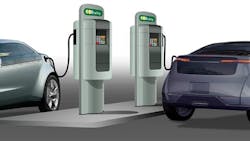California Utilities Want $1 Billion for Electric Cars
To help the state meet its goal of getting 1.5 million zero-emissions vehicles on the road by 2025, California’s utilities are asking for more than $1 billion to spend on electric car-charging stations.
Edison International’s Southern California Edison utility asked state regulators for permission to collect $570 million from customers over five years to pay for, among other things, equipment installations that’ll support about 1,800 charging stations for electric trucks.
PG&E Corp. requested $253 million for efforts including charging systems for electric buses and delivery trucks. Sempra Energy’s San Diego Gas & Electric utility said it was applying for $244.1 million for similar programs.
California is moving forward with plans to cut greenhouse-gas emissions and fight global warming, despite President Donald Trump’s promises to kill similar efforts on the federal level. About an hour after Trump took office, the state’s air regulators released a plan to cut emissions to 40% below 1990 levels by 2030.
“The key aspect of this is all about greenhouse gas reduction,” Southern California Edison President Ron Nichols said of the utility’s request for funding. "We’ve got to start looking beyond the electric power supply."
Weakening Sales
The utility industry is looking to electric car-charging as one of the few areas of growth as the increased use of rooftop solar panels and energy-efficient appliances weakens power sales. Last month, regulators approved a scaled-down version of PG&E’s plan to invest in charging stations. Edison was cleared last year to spend $22 million to support as many as 1,500 car-charging ports in its service area.
SoCalEd’s filing on Friday was in response to a request from the California Public Utilities Commission to come up with a plan that’ll help cut carbon emissions in the state, Nichols said in a telephone interview Friday.
Edison’s plan includes pilot programs for the charging of electric buses and equipment at transportation ports, installation of 50 fast-charging stations and rebates for some residential customers, the company said.
By Mark Chediak
About the Author
Bloomberg
Licensed content from Bloomberg, copyright 2016.
